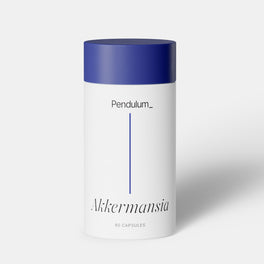Looks like your
cart is empty

Metabolic Daily
Improve metabolism

Akkermansia
Improves gut health

Polyphenol Booster
Increase antioxidants to protect cells
Stay in touch about special discounts, nutrition tips and additional education.
Looks like your
cart is empty

Improve metabolism

Improves gut health

Increase antioxidants to protect cells
The signs of an unhealthy gut include changes in bowel habits, but other signs might be less obvious. They include persistent fatigue or low energy, sugar cravings and unstable appetite, frequent illness, skin issues like eczema or acne, bad breath or unusual body odor, and more.
A community of bacteria and fungi live in the digestive tract, making up your gut microbiome, which can consist of both beneficial and problematic microbes. The key to a balanced gut microbiome is species diversity, where good microbes keep the bad guys in check.
When an imbalance ensues, you may experience any, or several, of the following 10 signs of an unhealthy gut.
“A healthy gut impacts every organ system in the body,” says Alyssa Wilson, MS, RDN, LD, at Pendulum Therapeutics. “It supports the immune system, mood, metabolism, and more, making it the foundation to overall well-being. Addressing symptoms early can reduce overall inflammation and improve daily quality of life. Gut imbalances often worsen over time and may become harder to treat if left unchecked.”
If you experience any of the following issues, seek an evaluation with a healthcare provider. These symptoms could reflect underlying gastrointestinal issues, such as irritable bowel syndrome (IBS) or inflammatory bowel disease (IBD), and your provider can help you explore and figure out what’s going on in your gut and how to improve your gut health.
For people assigned female at birth, keep in mind that other conditions, especially those affecting the pelvic area, could also contribute to abdominal symptoms. These include endometriosis, polycystic ovary syndrome (PCOS), and uterine fibroids.
Here are the most common signs of gastrointestinal problems in adults and how they may be related to an impaired gut microbiome.

The digestive tract and your mind communicate and interact via the gut-brain axis, and the gut microbiome plays a key role in that connection. Research suggests that gut microbiome imbalances can trigger gastrointestinal symptoms like bloating and distention, gas, and constipation—and that restoring balance may help ease these negative symptoms.
“The gut microbiome is a key modulator of your bowel movements and can affect the consistency, frequency, and bulk,” says Taylor Berggren, MS, RDN, with Pendulum Therapeutics.
Your gut microbiome ferments (breaks down) certain food components that the digestive enzymes produced by your gut can’t digest, such as complex carbohydrates and dietary fibers. The fermentation process produces short-chain-fatty acids (SCFAs), which are helpful byproducts your body uses. If you have a lack of microbe diversity affecting these processes, you may experience symptoms.
“Some studies have shown that a microbiome lacking in short-chain fatty acid production is associated with constipation,” Berggren says. “Some of the best probiotics to produce short-chain fatty acids like butyrate and propionate include Akkermansia muciniphila and Clostridium butyricum.”
Most of us have experienced occasional diarrhea, which can result from a virus or other illness, an increase in prostaglandins during menstruation, and more.
But frequent diarrhea could stem from a gut microbiome imbalance, also called dysbiosis. “When you have an overgrowth of some bacterial species, paired with low presence of healthy commensal and keystone species, you have dysbiosis,” Berggren says.
Research shows that diarrhea is associated with lower bacterial diversity and may contain increased bacteria from the genera Escherichia, Campylobacter, and Streptococcus, while containing a lower amount of keystone species (crucial regulators of the gut microbiome), such as Prevotella copri, Faecalibacterium prausnitzii, and Dialister succinatiphilus.
Our energy levels can undergo natural shifts. Some days we just feel less energetic for a variety of reasons. With persistent fatigue, your gut microbiome could partially be to blame. Research draws connections between gut microbiome imbalances and myalgic encephalomyelitis/chronic fatigue syndrome (ME/CFS), for example.
Your fatigue may not be as severe as with ME/CFS, but just a general feeling of sluggishness. If so, some level of mitochondrial dysfunction could be at play. Mitochondria are the powerhouses of cells, and these little engines produce adenosine triphosphate (ATP), the universal form of energy that powers bodily processes.
The gut microbiome plays a role in how well mitochondria function and therefore how your body produces and uses energy.
“Certain microbes like Akkermansia and Clostridium butyricum help produce SCFAs that can influence energy metabolism,” Wilson says.
Some food intolerances and sensitivities may be inherited, and some share a link to increased intestinal permeability.
This term—used if any part of your gut barrier function is compromised—is colloquially called “leaky gut.” The gut barrier or gut lining, helps keep bad bacteria, toxins and other inflammatory substances from entering the circulation. The gut lining contains specialized goblet cells that produce a protective mucin layer that lies on top of the gut lining and is inhabited by immune cells. When it’s damaged, this protective barrier can “leak,” allowing problematic substances within the gut lumen to go where they shouldn’t.
“Increased intestinal permeability allows increased contact between microbial components and other substances within the gut to have increased interactions with the immune system and trigger inflammatory responses.,” Wilson says. “This can lead to inflammation throughout the body as well as heightened sensitivity to certain foods. Chronic barrier dysfunction may contribute to new or worsening food intolerances over time. Repairing the intestinal lining often helps reduce reactivity to common triggers.”
Your gut microbiome also matters for your mental health. As mentioned above, your brain and gut communicate via the gut-brain axis with the microbiome playing a role in this crosstalk. When one isn’t feeling so great, it can affect the other. Research has found links between microbiome imbalances and mood issues, brain fog, depression, anxiety, and other mental health concerns.
Many factors influence food craving and appetite levels. One you might not be aware of is your gut microbiome. Microbes can play a role in what you desire to put in your mouth.
Research is still ongoing regarding the exact mechanisms, but studies suggest that some microbes manipulate our reward pathways within the brain, produce toxins that alter mood, and disrupt the gut-brain axis. These factors could lead to cravings for high-sugar foods or appetite fluctuations.
Your gut microbiome also impacts your metabolic health—how efficiently your body converts nutrients into energy. Beneficial bacteria create SCFAs, which then stimulate the secretion of glucagon-like peptide-1 (GLP-1), a gut hormone that helps regulate appetite and improve insulin sensitivity. The opposite of insulin sensitivity is insulin resistance, a condition that results in elevated insulin levels and can drive cravings for sugary or high-carbohydrate foods.
Through their direct and indirect effects on various hormones, gut microbes might affect weight. For example, an imbalance of harmful bacteria can drive food cravings and increase appetite, leading to difficulty with weight management. Research has linked gut microbiome issues with obesity, type 2 diabetes, and other cardiometabolic diseases.
On the other hand, the beneficial byproducts that some microbes produce can aid with weight management through a chain of events. For example, the probiotic strain Akkermansia muciniphila helps break down mucin, a protein in mucus, which then releases nutrients that other bacteria need. This, in turn, helps these other bacteria generate butyrate, an SCFA that helps increase GLP-1, which then regulates appetite.
The immune system and gut health are intricately connected: About 70% to 80% of immune cells live in the gut. So imbalances in the gut microbiome and issues like leaky gut can contribute to inflammation and increase susceptibility to infection.
“Having a strong, healthy, and intact gut lining is your first line of prevention from any type of systemic inflammation or activation of the immune system against toxins and pathogens,” Berggren says. “Secondarily, keystone bacterial species like Akkermansia muciniphila and Faecalibacterium prausnitzii can produce compounds that are key to your immune response and overall health of your immune system.” One example is interleukin 10 (IL-10), a cytokine, or anti-inflammatory protein.
We’ve established that the gut and brain communicate, but so do the gut and your skin via the gut-skin axis. Gut imbalances that allow bad microbes to flourish can therefore play a factor in skin conditions, such as eczema or acne.
“The integrity of the gut lining is so important to preventing inflammation throughout the body, which can lead to skin issues,” Berggren says.
The gut microbiome can also play a role in how we smell, from breath to body odor. Via the gut-skin axis, gut microbes can influence skin microbes, altering the scent of sweat and other bodily fluids. Additionally, gut bacteria can produce volatile sulfur compounds (VSCs) when they break down proteins or amino acids, causing bad breath.
However, Berggren says, “The oral microbiome and your skin microbiome are more commonly to blame for an off scent.”
Gut imbalances are also called gut dysbiosis. And you may have heard of several specific types; here are a few examples:

Now that we’ve explored the many ways a gut microbiome imbalance can affect health, you may be wondering what might cause an imbalance in the first place. Here are a few potential culprits.
Some factors that affect the gut microbiome are out of our control, such as how we were born and whether we were breastfed. Whether you were born through vaginal delivery or cesarean section (C-section) can even affect your gut balance. Infants born via C-section reflect the skin microbiome of their birthing parent, while those born vaginally instead reflect their mother’s vaginal microbiome. Researchers are still trying to determine how these differences affect the gut.
And breastfeeding, although not always possible, is one of the most influential factors of a healthy gut microbiome in early life, since breast milk contains beneficial microbes. The oligosacchrides in breast milk are optimal for fermentation bacteria that support the development of a healthy microbiome.
We may not have control over some of our environmental exposures and whether we’ve had to take antibiotics or antifungal medications. However, we do have control over other factors affecting our gut microbiome, such as our physical activity level, sleep health, stress levels, and diet.
In addition to eating a diverse, plant-rich diet and reducing your intake of refined sugar and highly processed foods, Wilson suggests eating more of the following to help balance your gut microbiome.

Additionally, you may wish to take a multi-strain probiotic to help diversify your gut microbiome and boost the effects of dietary and lifestyle changes.
Manage stress through practices like meditation, yoga, engaging in your favorite hobbies, spending time with loved ones, etc. And prioritize good quality sleep by getting at least seven hours per night and mitigating disruptive factors, such as light or noise pollution, as much as possible.
Engage in regular exercise by finding activities you enjoy, such as running, hiking, swimming, joining a recreational league, and more. Aim for about 150 minutes of moderate-intensity exercise and at least two strength-training days per week.
Remember that the signs of bad gut health mentioned in this article could be a result of underlying gastrointestinal conditions or those that affect the pelvic or abdominal area. If you are experiencing ongoing or severe symptoms, consult your healthcare provider for an evaluation.
Constipation, bloating, diarrhea, fatigue, and food intolerances or sensitivities are just a few of the unpleasant, frustrating symptoms that may point to a gut microbiome imbalance. Even seemingly unrelated issues, such as eczema or mood fluctuations, may be related to gut health. The best way to tell if your gut is unhealthy is to seek an evaluation by a healthcare provider.
The best fix for an unhealthy gut will depend on what’s causing the issue in the first place. If you have an underlying condition, your healthcare provider can formulate a treatment plan tailored to your specific health needs. They can also help identify whether your symptoms are resulting from a gut microbiome imbalance and advise on whether lifestyle changes or a probiotic would be beneficial.
Four common signs of poor gut health include changes in bowel habits, persistent abdominal discomfort, bloating or distension, and excessive gas, but you may also experience other issues, such as the unexpected ones outlined above.
Plain water is one of the best things you can drink to support your gut health. It supports the gut microbiome and helps your body break down food, soften stool, and transport nutrients and waste through the digestive tract. You can also consider adding electrolytes to support hydration, depending on your activity level, climate, and more.
Content is for educational purposes only and has not been evaluated by the Food & Drug Administration. Statements and products are not intended to diagnose, treat, cure, or prevent any disease.